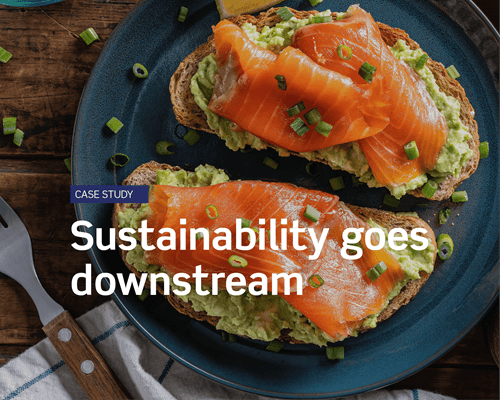 Salmon is an important - not to mention delicious - source of nutrition for a growing number of consumers striving to eat healthier diets. For example, it’s an important source of the fatty acid omega-3.
Salmon is an important - not to mention delicious - source of nutrition for a growing number of consumers striving to eat healthier diets. For example, it’s an important source of the fatty acid omega-3.
Salmon gets its own omega-3 from a diet containing fish oil derived primarily from wild-caught fish. The challenge? The supply of this fish oil has been stagnant over the last years as our oceans are put under increasing pressure. Put simply, manufacturers of fish feed need alternatives to satisfy their omega-3 demand, which is now experiencing growth of between 2% to 4% annually. The good news? Corbion is working with the aquaculture industry to help meet this shortfall and achieve sustainable growth - through our world-leading family of algae-based omega-3 ingredients. “It’s a great example of how the company is meeting the needs of customers, consumers and the planet through sustainable impact,” says Vice President of Corbion Algae Ingredients, Tim Rutten.
Facilitating growth and reducing pressures on our oceans
Traditionally it has taken approximately three kilograms of wild-caught fish to produce a single kilogram of farmed salmon. But now this is changing.
“Supported by our algae-based omega-3 in their formulations, salmon producers now need less than 0.7 kilograms of wild fish to produce a kilogram of salmon,” explains Tim. “So, in terms of sustainable impact, we are helping to reduce pressure on our oceans today; but also enabling our customers to meet the growing demand for feed that is rich in omega-3.”
This takes on even greater significance when you consider the detrimental effect that rising ocean temperatures can have on global fish stocks and oil yields.
A uniquely renewable solution
Climate change is clearly affecting marine life. However, it’s another area where Corbion is delivering sustainable impact – using both renewable energy and renewable feedstock as part of a manufacturing set up that is unique to the industry. Algae is produced via low-impact fermentation from locally sourced sugar cane and then the leftover feedstock is converted into renewable energy.
“This is great for our oceans but also for our customers and their customers such as the large salmon farms in countries like Norway - who are now also committed to various science-based targets,” says Tim. “Based on the published life cycle assessment, our algae omega-3 has a 38% lower carbon footprint than fish oil. Our ability to share data like this downstream is crucial to building stronger relationships with these customers.”